#fate analysis
Text
Fate/Apocrypha and Putting Trust Into Human Nature
I believe that one major overarching theme in Fate/Apocrypha is the ability to put one’s faith into humanity despite its cruel acts. This theme connects to several major characters in Fate/Apocrypha and is an interwoven in the narrative.
Sieg is definitely one of the characters that this idea relates strongly to. Sieg’s perspective on the human condition and how it changes across the show is interesting due to Sieg being only a couple of days old. This theme really starts appearing during the events prior to his encounter with Jack the Ripper. When Sieg and Astolfo are going about the town, it is Sieg’s first encounter with a community and he is amazed by what he sees. However this perspective of humanity is severely affected by Jack the Ripper. In Jack the Ripper’s world, Sieg is abruptly made aware how cruel humans can be and he is severely shaken up by it. He later tries to ask some of servants about their perspectives human nature.
Speaking of servants, let’s move our attention onto Astolfo. Although in part due to Astolfo’s simple mindedness, Astolfo in a geninely good person who does try to save people and believes in them mainly out of his insane level of optimism.
One of the other servants that Sieg asks for their opinion on if human nature is inherently good is Mordred. He asks her if she thinks human ethics are justified. Mordred states that humans are humans and there behaviors are circumstancial but overall human nature is self serving and selfish. Astolfo rejects Mordred’s opinion. Mordred goes onto ask Sieg what he thinks. Sieg states that he was beginning to admire humans until he learned about the past of Jack the Ripper and now he’s unsure. Mordred says she doesn’t know either and doesn’t care, as all they wants to do is to become king. The irony here is that Mordred later realizes that the reason they wanted to become king was to ease the burden placed on Artoria, who after not acknowledge that Mordred was capable, Mordred rebelled against.
Next up is Jeanne d’Arc. Jeanne possesses a love of humanity despite the fact that she is entirely aware of the acts that humans have committed and was guilty of committing them. She forgives even those who burned her at the stake.
Contrasting with Jeanne d’Arc we have Amakusa Shirou Tokisada. Similar to Jeanne, Shirou is fully aware of how cruel human nature can be, with him witnessing many horrific acts in his lifetime. Shirou believed that human nature is inherently destrustive and thus in order to achieve salvation the negative aspects of human nature must be destroyed. Other character see the faults in this solution, as although human nature has many negative aspects, there is inherent value in the progression of humankind
A major theme in Fate/ Apocrypha is putting one’s faith into the goodness of human nature while being aware of the negative aspects of humankind. Fate/Apocrypha explores this aspect of the human condition and shows that putting faith into others is not necessarily a sign of naïveté.
Sources
Fate/Apocrypha
Type Moon Wiki
#fate series#fate apocrypha#Sieg fate#astolfo fate#Jeanne d’Arc fate#Amakusa Shirou Tokisada fate#fate analysis
24 notes
·
View notes
Text
I Need A Challenge
ushijima wakatoshi x reader
words; 3804
synopsis; she writes a scathing review of ushijima's volleyball skills. how else should he respond if not by inviting her out to dinner?
She was tired of people like him. People who had no reason to be so stereotypically perfect. Everyone knows the type, comically good looking, is a prodigy in their one specific thing, acting so nonchalant that it ends up becoming their token personality trait. It was all so boring to her.
Which is why, as she was taking notes in the most recent Volleyball Nations League game, she wrote down some very harsh words for her analysis of star spiker Ushijima Wakatoshi. It was just the brutally honest truth of the world, she reasoned. Her editor, after reading the article she wrote at the game, almost dropped their jaw in shock at what she had written.
“This is really,” Editor Xhou sucked in some air through his teeth, “This is almost borderline libel material.”
She inspected her nails, shrugging as Xhou kept talking to her.
“I mean, you said that he is, and I quote from your own words, ‘Ushijima is the default setting for a volleyball player, there’s nothing too particularly unique’. You want me to let the paper publish this?” Xhou leans back into his office chair, pushing his glasses up and sighing.
“I write the truth, and the truth is that when Ushijima is on the court, you always know the exact plays he’ll make, the exact moves he’ll execute. The result is consistently the same. The games are too predictable when he plays.” She stands up from the seat opposite to Xhou.
Xhou sets the paper on his desk, checking that she really is okay with the article having her name attached to it.
A thumbs up is the only response she gives to her supervisor.
Xhou stamps the paper with his name, and faxes the documents to the coordinator putting together the sports magazine review for this issue. He wonders if the legal team is going to get involved again, he remembers the last player she reviewed, he was crushed and had to move to Alaska to play in a much smaller league. Xhou fully believes he’s going to get the magazine sued for letting her article fly.
Tendou finishes his squat set, hanging up the weights with a heave. Ushijima finishes his hundredth bicep curl, finally finishing his repetitions of this exercise.
Tendou pokes some fun, “I'm so sad for people without legs, they have to skip leg day.” He muses, trying to see what reaction or comment his best friend will make. Tendou twists and flexes in the full length mirrors lining the gym.
Ushijima only responds with a nod. He checks his phone, only to see that he’s received a little over four hundred notifications and counting. The beeping and noises start to pile up. Tendou peeks over Ushijima’s shoulder and gasps, he steals Ushijima’s phone away and immediately investigates what all the hustle and bustle could be related to.
“You should probably read this article, I think the writer has it out for your throat Wakatoshi.” Tendou grimaces while handing the phone back.
He skims the article, viewing the main talking points and major issues the author brings to light about his play style. His boring, everyday genius playstyle. He’s read criticisms of his volleyball skills before, but this one doesn’t seem too targeted solely about him, just using him as the mechanism to get a broader point across about the lack of challenges in volleyball recently. He chuckles at one of her comments, reading it aloud.
“Monster generation? I need a real challenge from these players, but all they’re giving me is platinum dreams without true passion and anger for the sport. I want them foaming at the mouth with new tricks, but I’m getting the same exact game over and over again.” Tendou cringes as Ushijima reads the words out loud. Ushijima stifles another chuckle.
Ushijima tucks his phone into his pocket, picking up his duffel bag. “I like her. She knows volleyball.”
It wasn’t just her comments, it was also the name of the author that Ushijima liked.
Tendou drops his water bottle in response to Ushijima’s behavior, stunned at the openness of amusement he has for the article and for the investment he has for this particular reporter.
Ushijima’s manager says that she’ll have a cease and desist letter issued to the paper for publishing such a slanderous piece. Ushijima proposes an entirely different solution.
She didn’t expect to be sitting at a restaurant, pencil and paper in hand, waiting for someone she just dragged through the mud to arrive so they could share a meal and an interview.
It was winter, and her reading glasses had fogged up slightly in the difference between the outdoors temperature and the warmth of the restaurant. The main features of the restaurant was the Western Style dining choices and decor, it reminded her almost of a hibachi place, but instead of Japanese food it was just a bunch of American and European dishes.
“It’s nice to see you again.” Ushijima pulls out his chair and settles into it, grabbing his glass of water so he can drink from it.
“High school seemed so long ago, but yes it is nice to see you again Wakatoshi. Sorry for the piece, your name just carries the right amount of importance to get my bigger points across.” She crosses her legs, setting her pencil behind her ear. The waiter comes around and takes their orders. He asks for the salmon, and she gets the house soup.
“No, I totally get it. But the statement about how people just continually eat up the single dish I serve? I thought you would’ve found a better analogy for my consistency on the court.” He just smiles at her, watching her move the pencil from behind her ear to her mouth so she could chew on it a little. One of her tells of when she was deeply thinking about how to respond to something.
Ushijima remembers all the stories she would write back in high school, ranging from sports analysis of Shiratorizawa clubs for her journalism extracurricular to getting paid to write love letters from person to person. She garnered enough money to pay for a new laptop and her entire wishlist of stationery items.
He remembers her lending him a pen once during class, it was a weightier metal pen. The ink was so black he was sure it was made of pure darkness. While he admired the pen she went into a rant talking about the pen itself, the quality of it and how it took forever to be delivered to her. They both got chastised by the teacher for having a side conversation and had to sit outside the classroom. But they ended up talking outside the classroom despite being told not to.
“Like you’d know what a good analogy looks like.” She hides her smirk behind a spoonful of soup. Ushijima appreciates her ability to be unapologetic, her honesty and bluntness matching his own linguistic traits.
They talk for three hours, about volleyball, life after high school, the article she wrote, about friends and the situations they found themselves in. Ushijima talks about Tendou and his chocolatier aspirations, she brings up Semi Eita’s new album that actually sounded truly alternative and unique.
He remembers her having a crush on Semi throughout high school. He didn’t really see why she would sit at their practices sometimes, just sighing wistfully, before freezing and turning flustered when Semi tried to make conversation like a normal person. But when Semi was seen to be a slight habitual complainer, she grew a distaste for him. Ushijima was sure that Semi was her longest crush, clocking in at around two months or so.
Ushijima did enjoy that she came to their practices sometimes, because then he could ask her about her pen collection and she would openly, loudly, and enthusiastically layer on every detail she could fit into her remarks. And she was someone who asked him about his favorite things, primarily volleyball but also about reading the advertisements in the Weekly Shonen Jump Magazine. Or about how good a runner’s high could feel sometimes.
Around her, he could share without fear of being misunderstood. She just accepted what she heard, and then analyzed it, taking her time and asking clarifying questions. He did his best to emulate her mannerisms and tact within their conversations, usually failing, but she didn’t mind.
She did openly declare an aversion for him throughout high school, that genius powerhouses should never be entertained with acknowledgement. What others considered harsh from her was almost like beaming encouragement for him. It was like she was telling him, if he didn’t continually improve and advance then the stagnation would leave him in the dust. A push in the right direction was more accurate of why she would say what she did about him.
He takes the bill from her, puts his gold debit card on the clipboard, and returns it to the waiter before she can even open her purse. Rolling her eyes, she sets some bills on the table and slides it over to him. Glaring at him until he accepts the cash and puts the bills into his wallet.
“Are you dating anyone right now?” Ushijima inquires while they walk down the street to get to the train station. The night air leaves a chill around the two of them. He had his hands tucked into his pockets, and she had her arms folded over her body.
Snow falls from the sky, catching the lights and making streaks of color burst in small flickers like fireflies. The piled up snow in the roads hadn’t yet been plowed thoroughly, and wasn’t sullied with pollution that made it yellow and black. The snow was much more like a blanket.
“Listen, I’m what people consider easy to love but hard to please. Most people say they felt like they were never enough for me when we were dating.” She bites on her bottom lip a little. It’s a confusing feeling to be unnerved by him, and she feels even more uneasy when she realizes that she’s speaking too openly. “I don’t intentionally degrade those I date, I just, I have high expectations. I don’t give many second chances.”
His breath comes out in puffs of white, winter nipping at his nose which makes him feel uncomfortable. He wonders if she’s as cold as him. He knew that she had high expectations, none of the boys at their high school got remotely close to being romantically involved with her. She wanted more than what most people could offer. She wanted someone who was as open as her.
She feels a little guilty about her article now. Maybe she pushed the words a little too much on his bad qualities. Ushijima really wasn’t that bad, he was just dependable and rational, which crafted his playstyle of being an ultimate pillar of strength for a team. Why shouldn’t a team go with the most reliable way of scoring points? Then she shooed the thought. If volleyball wanted to keep being popular, it needed to evolve.
“I liked your article a lot.” He offers, segwaying the conversation, knowing her thoughts better than she knew them. “Power goes far, but even then, there’s ceilings that need to be broken. There’s talents that need to be unearthed, planted, and then allowed to bloom.”
They sit on the bench under the covering for the train station. The screen shows that the train she needs to take will come in around ten minutes.
“Thanks. My editor was worried you were going to sue me for what I wrote.” She laughs a little, rubbing her hands against her thighs to build up some lingering heat in her hands and her body.
He passes her his gloves from his jacket pocket. Making a small hum he waves them in front of her. She accepts and embraces the black fleece covering her fingers.
“Oh, no, there’s no way I’d want you to be sued. But I do want you to add another part to the article.” He blows some air onto his hands, rubbing them together. She raises an eyebrow inquisitively, turning towards him on the bench.
Once he had finished reading her piece on Ushijima’s game, he went through and read all her other articles. He found out her favorite current player was actually Hinata Shouyou, the energetic innovator. She had written about his unique approach, due to natural athleticism. Also about his experience in Brazilian beach volleyball making his defense skills unique in the field of both Japanese volleyball and on a global scale. It was all about Hinata this, Hinata that. But could the ultimate decoy ever compare to the pillar of strength?
“What do you want me to change? I can’t make any promises.”
“Say I’m your number one, because I don’t do last place.” Ushijima lifted her chin up, looking right into her eyes. He inspects her face, the small miniscule motions her features display show that she’s listening, actively listening. “Did I ever mention that you’re the only one that has my attention?”
She really was. The only reporter he cared to give quotes to after big games, the only girl who he ever wondered if there was any possibility to develop a relationship with. He was hooked on every word she wrote, every interview she hosted online. She was in his world, but never overlapped her social circle with his for longer than an hour at best.
She swallows thickly, “I’m sorry to say this, but I really am unimpressed by your playstyle.”
He raises an eyebrow, sliding his hand from her chin to the side of her neck. He can feel the way her pulse is racing under her skin.
“We both know that’s not true.”
Her train arrived. She ducked under his hand and made her way onto the train. Before the sliding door closes, she motions him closer so she doesn't have to yell.
“Then show me your talents. I need a challenger for my first place.”
Tendou lies on his stomach on the floor, Ushijima is reviewing some plays written by his coach. He scans for any play that could show off his left hand spikes, or any play that he could try and improvise a receive if he wasn’t on the front row rotation. The plays are different from what he’s used to. But his coach said that they were all optional, and that Ushijima’s playstyle was perfectly fine as it was. But ‘fine as is’ doesn’t earn him any accolades in her book.
Tendou perks up, “I always felt like fighting had romantic undertones.” He references what Ushijima had told him about how the dinner with his reporter went last week.
“But I don’t want to fight her? I’d hardly call a slight disagreement a fight.” Ushijima sets aside the packet he had been studying.
He opens his phone and refreshes the webpage for the newspaper she worked for. When nothing pops up under her name, he goes to the calendar page to see if she’d be attending an upcoming game he’d be playing in. He sets his phone aside when he realizes she will in fact be in attendance.
“But you do want to fight for her ‘first place’ hottie player ranking.” Tendou kicks his feet in the air, crossing his feet and tapping the top of his head.
Ushijima stands up and goes to check his closet, seeing if he needs to get a tighter jersey for the upcoming game. “She never used the word ‘hottie’ when talking about her favorite player.”
“So you admit that you do want to be her favorite player?”
Ushijima finishes trying on the jersey over his long sleeve compression shirt, the jersey fitted better than he remembered. He tugs on the front of the uniform. Then what Tendou said clicks for him.
Ushijima blinks, “I do want to be her favorite player.” He doesn’t see why he would deny that observation. Being her favorite player would be the ideal situation for him.
Tendou rolls over onto his back and wiggles his pointer fingers in the air, “You want to be more than just her favorite player.” He sings the words in a teasing manner.
“Maybe I do.”
One time, near the end of high school, she was talking during lunch. Her friends were uninterested, wanting to discuss boys or homework instead of her critical worldview analysis. Her table was right next to the table that Ushijima and Tendou were sitting at, their volleyball friends already outside tossing around a ball.
Ushijima listened in, drinking his milk while Tendou ate chicken nuggets. When her voice got quieter, almost to the point of fading out entirely due to her slowly realizing her friends were not as interested in the conversation as she was, Ushijima leaned in subconsciously, trying to catch her words.
Tendou pinched Ushijima, telling him that if he wanted to listen to her, he should ask her to come sit with them. Ushijima froze. So Tendou invited her to come sit with them. Placing her lunch tray down, she ate a carrot, sensing Ushijima’s hesitance and Tendou’s eagerness.
It was Ushijima that spoke first, “Keep going. You remind me of someone. He said almost the same thing, about his worthless pride and not forgetting about it.”
She brightens. Continuing her dissection of the value of pride, she refers to Ushijima as a reference point for pride. Using him in her examples and demonstrations of her illustrative examples. Around the third time she says his family name, he makes another request.
“You can just call me Wakatoshi.”
Tendou drops his chicken nugget, but quickly regains his pace in eating the arms off the dinosaurs.
She says his name, once and then twice. Letting it settle onto her tongue and leave a trace of what a first name basis could mean. Pondering on that instead of her newest philosophy interest is quickly dropped. She only ever calls him by his name from then on.
Needless to say, the next game he plays at, she’s there, with her notepad and pen. Each receive, hit, serve, and toss is carefully recorded on her paper.
He doesn’t do anything too off the typical, but he does try new things his coach had mentioned. Pressuring an opponent’s highest scorer more, trying a few block kills when he’s in the right rotation, scoring some points off the tip of the blockers hands instead of cutting right through their attempts to defend. He’s more tired after this game than his last one. Yet, he had more fun this time around. His teammates seemed thrilled with the results of never having a gap less than five points.
After the game, before he goes to the locker room to debrief with the team and change into regular clothes, he stalks his way over to her. She’s talking to another reporter that had been sitting in the media section, but the other reporter just elbows her lightly when he notices Ushijima making an attempt to approach. The other man slowly walks away, bidding her a farewell.
She’s still sitting on the bench, cheekily covering her notes with her hand, and writing something down. When he takes a place next to her, he spreads his legs a little, expanding his presence and bumping their thighs into each other. She initially retracts from the touch, but relaxes into it.
He’s aware that his body is thinly sheened with sweat. It drips from the hair at his nape down his back and soaks into his player kit. She brings her notepad up to her face, looking at him over the spiral binding of the paper. Trying to hide her comments and analysis of the game, which had been overwhelmingly positive for Ushijima.
“What’s your professional opinion of the game?” He uses a finger to push down her notepad that was covering her nose. A streak of ink and pencil lead was across her cheek and nose. He brought his thumb up and wiped away the markings. At first swipe, nothing moved, so he slid his thumb over again with just a little more pressure.
“It was entertaining in a different sense. Rather than being solely athletic entertainment.” She licks her own thumb and finishes wiping away all the marks that she could feel him trying to get rid of. She misses a sliver on the apple of her cheek but he doesn’t say anything, enjoying the way that it makes her seem less intimidating and more adorable.
“Care to share with the class?”
“Well, when a certain player keeps trying to make eye contact during the game, when he should instead be invested in the game, it does pose some interesting investigative questions.”
At this point, Ushijima slid his hand to her thigh, asking her to explain further, “Such as?”
“When will he get up the nerve to ask her on a date? Will he take her for a ride in that brand new car he got? Does he need glasses from how frequently it seemed he scrutinized the audience in search of her?” She pauses, then continues, “And will he be mad if she writes something about how attentive the setter was during the game?”
“Soon, for the date. Most definitely a long car ride to the mountains. His vision is actually perfectly 20/20, he just wanted to make sure she was having a good time by observing her reactions. No comments for the setter, he’s a rookie, and much less attentive than an older, more experienced player.”
She hums a little in regards to his answers to her inquiries. Soon, she tugs on the back of his hand, the hand that was resting on her thigh. She bites the cap off her pen, waving the pen in the air, close enough to his skin for him to understand the point of what she was communicating.
The pen tickled the skin of his hand, but he liked the way she put one hand under his to make his hand rest flat so she could write her piece on his body. Capping the pen back up, she tucked it behind her ear.
Written on his hand was a series of numbers, along with a small doodle of a volleyball.
Getting up from her spot on the media bench, she leaves him with a short statement.
“I liked your response to my challenge. Keep making the Monster Generation bloom with each game Wakatoshi.” She halts for a moment, then turns back to him, “You can be my number one on those conditions. Blooming the Monsters and responding to my challenges.”
He’d return every challenge she gave him if it meant he could be hers.
#haikyuu is filled with glorious philosophy and worldview shaping concepts#haikyuu!! x reader#haikyuu x reader#haikyu!#haikyuu!!#haikyuu#haikyu x reader#hq#hq x reader#ushijima wakatoshi x reader#ushijima#ushijima x reader#ushijima wakatoshi#reporter#journalist x athlete relationship#fluff#playful banter#back and forth with flirty undertones#fiesty and bold mc#mutual pining#one sided enemyship#he's just like- whatever my queen wants#she's a hater and i agree with her#my round about way of integrating philosophy into this piece#character analysis if you look for it#lilly's red string of fate
248 notes
·
View notes
Text

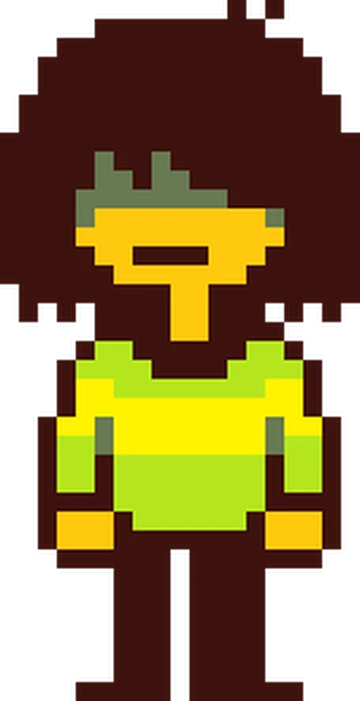
something interesting i realized while on the vessel-making screen in the deltarune introduction is that it's physically impossible to make kris: there is no hair that perfectly matches theirs (none have the cowlick or the right jagged shape on the bottom), and there is no sweater that perfectly matches theirs (none have a single stripe). this is fascinating, as it perhaps suggest that, if we (the player) had a choice, we *wouldn't* make kris. they aren't something we want, or are even capable of wanting, rather something we're stuck with.
and i suppose the fact that they can't be *created* as a vessel is telling, because we didn't create kris -- they weren't made for us, they're not a player avatar. they're a pre-existing person we just happen to gain possession of.
we weren't made for each other; they don't want us, and we don't seem to want them either (if the inability to choose to create someone like them says anything); funny, then, that in a way we're "soulmates"...
(both pictures are from the deltarune wiki!)
#melonposting#deltarune#deltarune kris#kris dreemurr#deltarune analysis#deltarune theory#kris is such a fascinating person. i want to study them under a microscope#we make them do things they otherwise wouldn't: wonderful things. horrible things.#at the end of the day who will kris be if their actions have been almost entirely us?#what responsibility will they hold for the manipulation and violence we've made them perform?#or what connection will they truly have to the friends we've directed them to make and the good times we've forced them to have?#this is just a random kid at a hard point in their life suddenly directed by an omniscient god with an indecipherable moral compass#kris and the player meant nothing to each other before - but now we hold kris' fate in our hands. we mean everything to them in a sense#and now as we play this game and are compelled by its story - including the things we have kris do - does kris not hold our fate as well?#do they not mean everything to us? (they mean everything to me anyway)#god this game kills me a little bit. god i love it so much
188 notes
·
View notes
Text
Strap in for the Soresu form III Obi-Wan lightsaber post. This is gonna be a sad one, girlies. We’re getting into Obi-Wan’s Fucking Trauma.
Qui-Gon’s death changed literally everything about Obi-Wan’s life, right down to the lightsaber form. Still a Padawan himself, he had to watch as an extinct monster from his nightmares* utterly took apart the form he’d learned since he was a child, and then, to complete the destruction, slaughtered the teacher who’d taught him the form and raised him. The devastation of Qui-Gon’s actual death had to be the last in a cascading series of horrors that started with the gut-sinking realization that Qui-Gon was losing. And if all of that weren’t enough, Obi-Wan also loses his own lightsaber in the same duel, a psychological blow to his personhood which we don’t have to guess at the significance of. Obi-Wan tells us the cost of it himself in AotC: this weapon is your life.
The Duel of the Fates on a sheer physical level is a devastating thing to consider. It’s a grueling, full out running battle, the likes of which we don’t see elsewhere in the saga. The beauty (and pounding musical score) of the fight distracts from the sheer brutality of it. Maul is physically attacking them at every turn; he manages to kick Qui-Gon hard enough to knock all 6’3 of him off his feet; he dumps Obi-Wan into a fall that seems to be several stories high. We don’t see Obi-Wan get back up off the floor with Qui-Gon’s body at the end of the duel, and I’d be surprised if he was physically able to even stand again so after the adrenaline faded and the soreness and exhaustion took over. He just been whirled in a lightsaber blender.
I can’t imagine how hard it was for him to pick up a lightsaber again after the trauma of that battle - much less, a new, unfamiliar one, not the kyber crystal that had been his since he was a child. The new canon’s emphasis on the spiritual relationship between a Jedi and their crystal makes this detail even more excruciating. The Ataru form itself must have felt broken and unusable. How can you put your trust in a form once you watched it be broken so ruthlessly?
And this is where Obi-Wan is so endlessly beautiful as a character. He goes through this horrifying experience of violent unmaking, and instead of avoiding lightsabers as an understandable trauma response, or picking up an overwhelming power and dominance form like V, he remakes himself into a master of Soresu: a form of simple, complete defense. He doesn’t attempt to become a weapon of attack like Maul did to disintegrate Ataru; he makes himself invincible, untouchable, with a perfect defense. Soresu works the pieces that fell apart for the Jedi in the Duel of the Fates to an advantage. It is a form of ultimate endurance, of playing out your opponent and staying up in a fight until the attacker is exhausted or angry. It preserves and it lasts. It is philosophical. It is considered. It lacks the showy flash of Makashi or Ataru and returns to the basics, even working in some of that battlefield meditation that Qui-Gon so believed in. And in that simple economy, it’s gorgeous and effective.
I have to wonder: is Soresu, on some level, a form of kinetic self-soothing for a person who faced an incredibly traumatic battle at a young age? Does Obi-Wan use it that way?
All of this is perfectly in keeping with the themes of the character. Obi-Wan’s story remains about life, about hope, about survival. The word he uses to describe the Jedi to Luke in the OT is important to me. “Jedi knights were the guardians of peace and justice.” Guardians. And what better lightsaber approach for a person who sees his role as one of protection than a form whose signature move is called “The Circle of Shelter?”
*Maul, of course, is a tragedy in his own right, but that’s a different post.
#star wars analysis#lightsaber nerd stuff#lightsaber forms#qui gon jinn#obi wan kenobi#disaster lineage#the clone wars#duel of the fates#the phantom menace#soresu#darth maul#star wars meta
700 notes
·
View notes
Text
Sun Wukong and Love

Found family, my beloved 💚💙🩷🧡💛
Sun Wukong, Intelligent Stone Monkey, Handsome Monkey King, Great Sage Equal to Heaven- going from the blind adoration of Azure Lion and the enabling permissiveness of Macaque and the rowdy shenanigans of his Sworn Brotherhood to the flawed and misfit pilgrims will live rent free in my head forever.
Wukong moving past a life where the “love” he receives stops when he fails or falls. Moving past a life where “love” can’t survive an argument.
Wukong learning what real love is.
Learning that real love has restrictions and boundaries and inherent equality, and is more than being treated as a king or leader.
And learning that if someone loves you, they’ll give you a second chance when you fail or fall short or disappoint them.
Sun Wukong learning to love.
#Lego Monkie Kid#LMK#Sun Wukong#Tang Sanzang#Zhu Bajie#Sha Wujing#Ao Lie#LMK Analysis#Some real rancid shit happened after I posted this on Reddit#Tempting fate AGAIN❤️❤️❤️
143 notes
·
View notes
Note
Can I hear your thoughts on this panel?
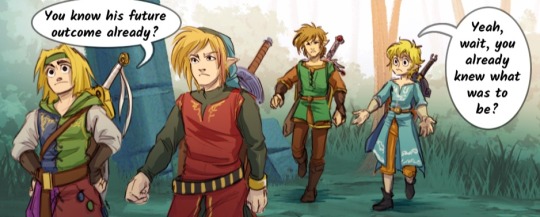
I feel that Hyrule looking at Legend as Four says that is important somehow... What do you think?
Hmmm
Well one thing I’ve noticed in the last couple of updates is Hyrule and Legend have been around each other A LOT
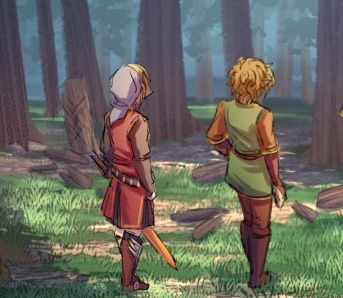
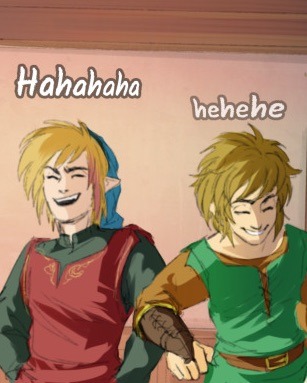
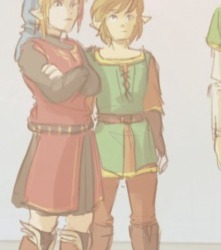
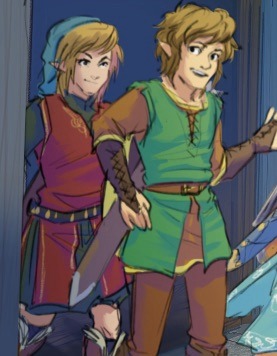
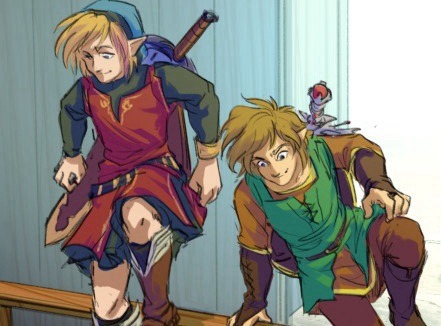
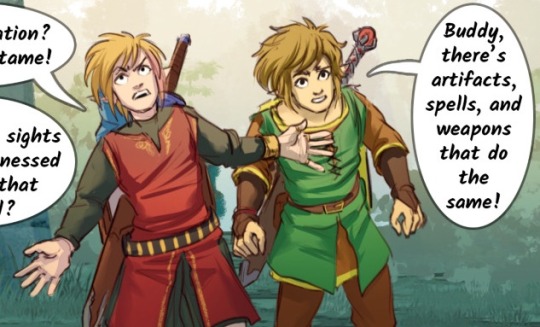
Practically ever since Hyrule finished healing Twilight and helping Four they’ve been hanging around each other. In close proximity too. Which, given that Legend usually only stands close to the people he trusts (principally Sky) is a big deal.
If Dawn pt. 5 is any indication, it seems that Hyrule is mostly initiating this lol
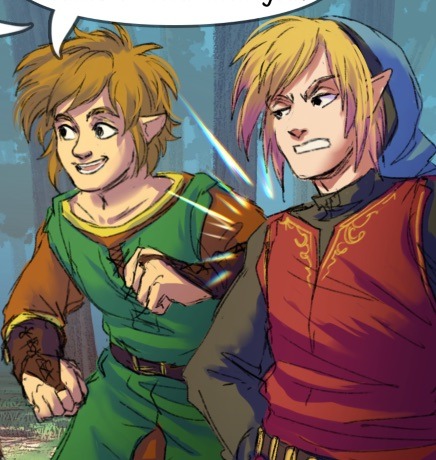
But Legend is letting him
Excuse me while I fangirl over the downfall duo for a moment. ALDNDLSDJSLDNSL THE BROTHERS EVER
Ahem ok let’s continue
Now, I’m overdue for a LU reread so correct me if I’m wrong BUT I seem to recall that they’ve never stayed this close to each other before. Could just be that they take comfort in one another’s presence. Seeing the panel you shared, though, I’m gonna say it’s more than that.
Idk if they’ve figured out their place in the timeline yet (I’m assuming not due to how everyone acted in Timeline Talk pt. 1). That doesn’t mean, however, that they haven’t begun to guess. Jojo has hinted at many interactions that the Links have had offscreen. Plus, Legend and Hyrule met up before they ran into the others. They’ve had time to get to know each other. I guarantee they’ve got suspicions about their places in time.
Which leads me to believe Hyrule is afraid of losing Legend. He must have figured out that Legend was a hero sometime before his journey began. Meaning, somewhere along the way he perished and the darkness he struggled so hard against spread over Hyrule anew. With Twilight just having escaped death (plus the cryptic comments he continues to make regarding Time’s fate), I’m sure untimely demises are on Hyrule’s mind.
I don’t think he knows Legend’s fate (unless there’s something in his games that hints toward the previous hero’s fate). But I believe he wants to. I can’t be the only one who sees the striking similarities between Legend and Time. He likely came to the realization that a guy like Legend will most likely die a wanderer or a warrior (doesn’t mean he did. I don’t like to think he did. One blorbo with a tragic end is enough XD But still). And being a hero and Legend’s friend he’s wondering if maybe, just maybe he can change that.
If it’s possible to know a future occurrence, it could be possible to transform it, right?
All image credits to @linkeduniverse
#also the ability or inability to change a person’s fate#seems to be a theme in lu#wild has to deal with the fate of his kingdom#twi is trying to save time from his regrets#trin answers#lovely littlelightfish#asks#linked universe#linkeduniverse#lu hyrule#lu legend#lu update spoilers#lu analysis
187 notes
·
View notes
Text
Illyasviel von Einzbern: The Hole at the Center of Fate/Stay Night
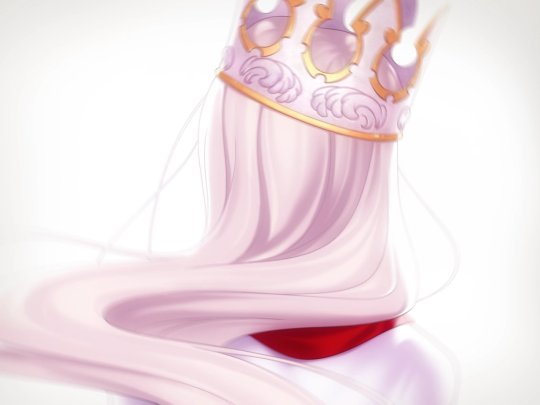
Emiya Shirou is the beating heart of Fate/Stay Night. Every character radiates outwards from Shirou, shapes and is shaped by him. He fights against foils like Archer and Kirei while growing alongside the three main heroines in each route.
There's really only one character who precedes Shirou in influence, who shapes him near-completely but cannot himself be shaped.

Emiya Kiritsugu is already dead, after all.
It's his legacy that drives the novel - but something oft-undiscussed is that Shirou only has half of it. He inherits his father’s justice, and the one that inherits his ruthlessness is Illya. Thus, Illya’s relationship to Shirou is dictated from the start.
She is everything his father left behind, the first gatekeeper of the moonlit world of death and magecraft that Shirou now finds himself in. In this role she transcends routes, appearing at the end of the third day to deliver a near-lethal attack just as the story branches off.

She seems intent to deliver Kiritsugu’s baggage to Shirou, to make him reckon with the past that he himself never experienced; the truth that a hero can only help those he sides with while many others are left alone in the cold.
In this way her very existence is a far more fundamental challenge to Shirou’s ideals than that of any other character - and yet this challenge is met only indirectly. Much of the information regarding her true identity and relationship to Shirou is elided until the end of HF.
She functions similarly to Sakura, a character who totally changes the reader’s perception of the first two routes in retrospect. The reveals about Illya force us to reevaluate how positive her ending in the Fate route really is.
In the narrative of Heaven’s Feel, both Illya and Sakura are considered ‘doomed’ - able to be saved only by Shirou sacrificing his own life to Archer’s arm.
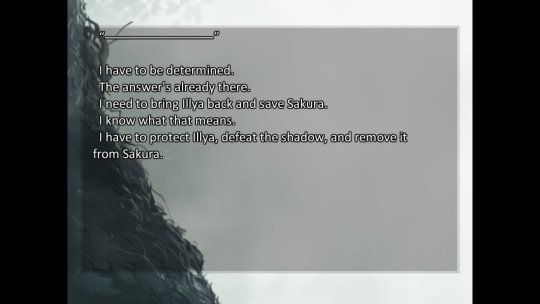
It’s the crux of their characterisation, in the same way that Saber’s pursuit of the Holy Grail leads her into timeless and uncountable doomed battles. In a route based around that character, you would expect fixing it to be the main thrust of the plot.
And so just as the Fate route is focused on Shirou clashing with Saber over her lack of regard for her safety, and Heaven’s Feel is focused on accepting even the ‘impure’ parts of Sakura, there is no route focused on showing Illya that she needn't give up on having a normal life.
Instead all of her scenes in Heaven’s Feel are about accepting that she cannot have one.
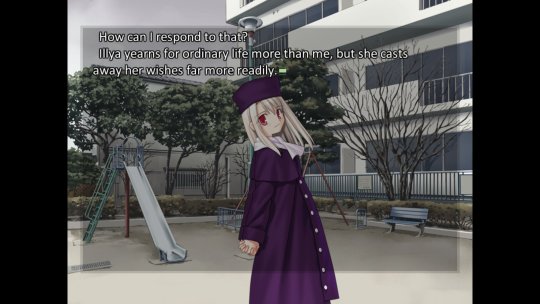
This is the hole in the center of FSN that I’m talking about. Its absence is felt keenly throughout the novel, because Illya has another role besides a specter of Shirou's past. She embodies the prize and object of the Holy Grail War itself - the very same wish-granting device.
Many of the characters in this story are not fighting for the Grail specifically, but nonetheless their strong personalities and desires cause them to clash with one another, in a process Kirei sees as comparable to everyday life.
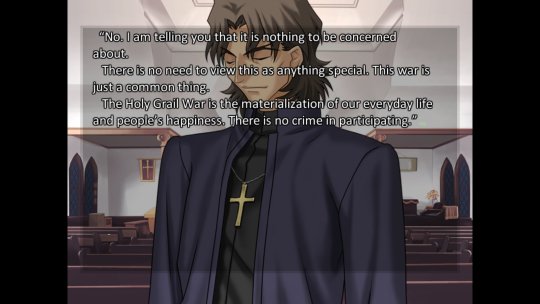
Their wishes, both in the form of the dead’s regrets and victor’s will, enter the neutral, empty Grail in order to produce a miracle. The only one not allowed a will of their own is the vessel of the Grail, who, in absorbing these desires, must completely erase their humanity.
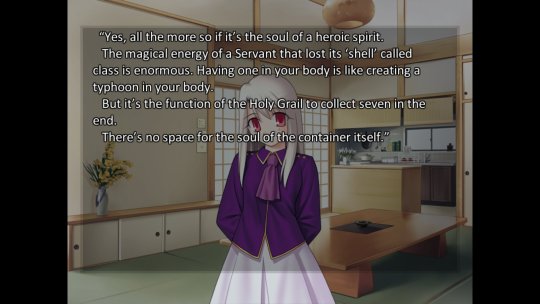
Illya is not intended to have a reason to pursue the Grail, nor any life beyond obtaining it. The war is premised on the sacrifice of the Servants, yes, but nonetheless they enter as contestants. Illya, like Justeaze before her, enters the ritual only as a sacrifice.
And yet an outside element is introduced. Illya being part-human, the product of an actual family rather than just a clone allows for her to have personal motivations. She holds on to her resentment of Kiritsugu, despite knowing that it’s pointless, because it’s all she has left.
A parallel can be made to the Grail itself. Supposedly a pure wish-granting device, it becomes corrupted through the influence of Angra Mainyu, one small, perverse wish colouring the whole thing black.
The desired salvation of the Einzberns, their thousand-year project relies on being able to reproduce the miracle, to understand every component part of their attempts in order to draw ever closer to the Third Magic, but Illya is a random factor, born to a human parent.
She’s also their greatest creation since Justeaze. Miracles, after all, exist because they are not understood.
The corruption of the Grail with the darkest desires of the world is just the inevitable result of any wish - the price of becoming a human instead of existing as a machine. Live long enough and anyone would turn into Zouken, higher goals suborned by a base desire to escape pain.
Like Illya the Grail is a failed project, a tool that can only provide salvation of a limited nature & only fulfill its purpose incompletely, proof positive that true perfection does not exist in the world of Fate/Stay Night.
In Illya’s case the bug in her programming comes fundamentally from a desire for family, for someone to be close to her. Despite her dysfunctional initial approaches she’s perfectly capable of living normally alongside Shirou.

The issue, then, is the Grail War itself.
Her two sides, two different origins, come into conflict here, and her role as the Holy Grail consistently wins. Not because she desires it in any real sense, but because she doesn’t believe that she can do anything else.
Consider how the Fate route ends with Saber and Shirou trying to live without regrets, accepting both the negative and positive aspects of the past without dwelling on that which cannot be changed.
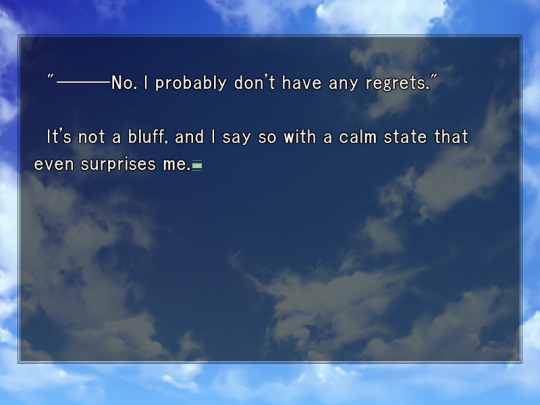
Consider how Illya in the Fate route doesn’t say a single thing about her condition, refuses to burden others with that knowledge, accepting the fact of her death and instead choosing to live in the moment.
Consider how the Unlimited Blade Works route is about Shirou trying to live without regrets, accepting that he will not always succeed, that his self-sacrificing nature will hurt him, but nonetheless his pursuit of that goal is worthwhile.
Consider how Illya’s death is used to illustrate this, how she cannot be saved regardless of whether Shirou makes the choice to intervene or not, how his sorrow is used as proof of his brokenness and his ability to move forward regardless is used as proof of his strength.

Consider why the Heaven's Feel route is named after the ritual that materializes the soul, why this is identified with salvation and rebirth by the Einzberns. I would argue that the Third Magic is a metaphor for the process Shirou undergoes throughout the novel.
He evolves from a machine into a human, gaining his own desires and the will to live. And just as Heaven’s Feel, the ritual, requires a sacrifice: Justeaze’s blood forms the foundation, so too does Heaven’s Feel, the route: Illya spends her own life to fully realize Shirou’s.
In moving past Kiritsugu’s legacy, he moves past his belief that his life is worth less than others. He wants to live, wants to let Illya save him, wants to let her sacrifice herself for him. In moving past Kiritsugu’s legacy, he moves past Illya.
I don’t blame him. I just want to emphasize how significant to this novel the existence of suffering is, how important the figure of someone who cannot be saved, how necessary a single person’s sacrifice. And how this falls on Illya in every route.
In the latter parts of the Fate route she quickly disappears from story relevance. Her functions as a Grail offer a convenient excuse to have her sleeping for much of the day, as it does for Kirei’s kidnapping of her, stringing her up as a sacrifice to open the gate.

In UBW we have Gilgamesh brutally ripping out her heart. He values her purely for her core, which holds the Grail, tossing aside the rest of her body.

If her role as the Grail is what drives her doom, though, she is at least partially able to overcome this at the end of Heaven’s Feel.
For a brief moment, Illya escapes the bonds of fate by uniting her deeply personal wish with the impersonal functions of the Grail.
She also dies. She fucking dies, okay? I’m so tired of talking about this as though it’s supposed to be a good thing, as though we’re just supposed to accept it as the best possible option.
It works precisely because we know there is another, because we know for a fucking fact that an Illya route could have existed, that her salvation is possible not just from a meta perspective but directly implied in-universe.
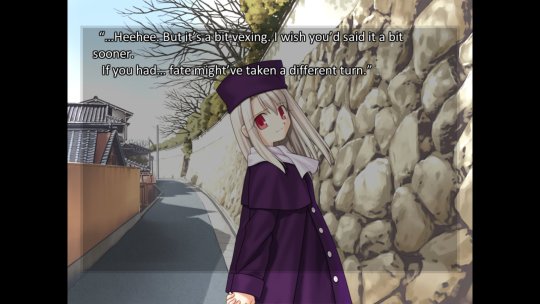
Illya’s power is to grant wishes, but she is incapable of giving voice to her own. She needs someone there by her side to tell her that it’s okay to want to live, and yet- Shirou is so fucking broken that he needs her to do that for him instead.
Illya could have lived, but she doesn’t, and in not doing so she carries half the weight of this story’s tragedy on her back.
In a way this is an excuse for the lack of an Illya route. I really do think its blatant absence adds something to Fate/Stay Night, really sells the tragedy of HF, becomes even more beautiful precisely because of its unattainability.
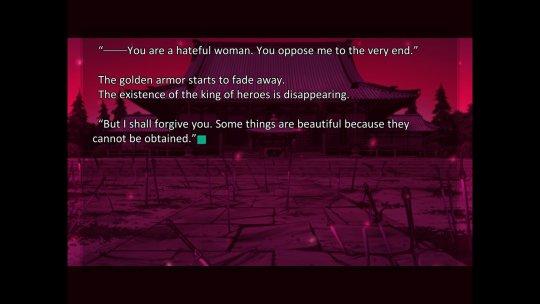
It’s a comment on how the artistic process, materializing your soul on paper if you will, is an inherently restrictive one, rife with failure and things left on the chopping board.
But it does not, not for a second, mean that we should accept the lack of an Illya route. It doesn’t mean the desire for it is a bad thing. It doesn’t mean that its addition would make Fate/Stay Night worse.
It would, however, become a different game at that point, and here I want to pay respect to the one that has lived alongside me for twenty years.
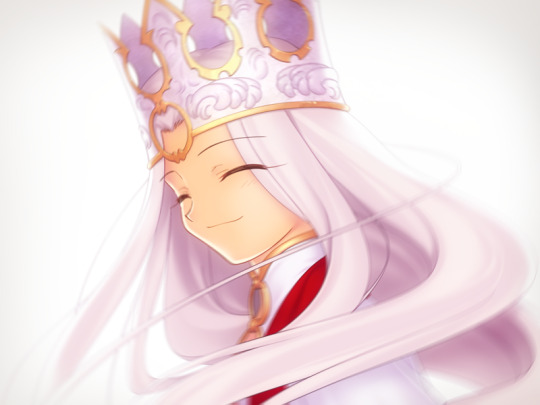
Thanks for reading, and happy anniversary to my favourite story of all time.
260 notes
·
View notes
Text
There's so much to be said about the line "They know" in Mizumono. It has so many different meanings. "They" is so many people.
Will is saying "Jack knows you're the Chesapeake Ripper".
Will is saying "Kade Prurnell and the FBI know we're all breaking the law."
Will is saying "Alana knows about you, about us."
But when you say the word "they", you talk about others. It's someone else. It's exclusive of the speaker. And isn't that the kicker? They all knew something. They all had goals.
Jack's goal was to kill and/or apprehend Hannibal.
The FBI's goal was to take in Jack and Will.
Alana's goal was to protect Will and herself.
But Will says "They know" because he isn't included in any of this knowledge. He doesn't have a clear goal. He doesn't know what he wants. Not until it's too late.
Did you notice in Mizumono that when Will gets out of the cab at Hannibal's house, he gets out sort of slow and unsure, but still relatively calm, until he sees Alana laying on the front walk? Then he hurries. Then he seems alert. Then he gets out his gun. It's a quick change. He's panicking because these people who are alive and with him are hurt.
Then boom, another quick change, because Abigail, who was thought dead and separated from him, is not hurt, she's here, and suddenly so is Hannibal, and the regret is replaced with panic. How did this happen? How is Abigail alive? Why didn't they leave? Why aren't they safe and far from here?
And you know why?
It's because Hannibal and Abigail, they know. They know (or at the very least Hannibal did) that Will betrayed them. They know that Will was supposed to be with them. And they know that it can not be that way, not now.
And Will, the double agent, the loyal soldier and the lovesick fool, he was blind. He did not know. He couldn't have.
#what a strange twist of fate that will and hannibal are both other#but even their otherness is not always the same#hannibal#hannibal analysis#hannibal meta#mizumono
403 notes
·
View notes
Text
I’ve been thinking about this for Karuna, but like. As bad as having to save the world over and over again may be. As soon as Ritsuka leaves Chaldea, they’re leaving their whole community and all the people they love behind, and can’t even talk about most of them. They draw so much of their strength and grounding from the people around them, and they’ll have to let that go all at once.
Like their whole community through the greatest hardship and joy of their life is made up of Ghost Liners, not human beings, and while that distinction doesn’t hold so much weight in Chaldea, outside of their little world it’s staggering. They’re a human who lives among Servants. Almost everyone they know is ghosts.
Which adds deeply, truly heartbreaking implications to their tendency to fill the roles of normal people with the Servants they know whenever they’re asked to envision the outside world, like in Kama’s interlude.
They just can’t face that inevitability head-on. They’ve gotten so good at compartmentalizing that it’s disturbing.
51 notes
·
View notes
Text
im so normal about the original hugh
so you know how Hugh's whole thing is based on Flowers for Algernon right? so in the story, Algernon is a lab rat (well, mouse) used in an experiment to improve someone's intelligence
the Algernon in Servamp, however, isn't the old man named Algernon, but the original Hugh, whose body was used to revive the old man.
The story is titled Flowers for Algernon because in the end the protagonist asked people to leave flowers for Algernon the mouse who died because of the experiment as the protagonist left because he couldn't deal with the change that happened after people realized they had been cruel to him
Mirroring that situation, Hugh the Old Child's whole story is dealing with the grief of losing the original Hugh and not being able to mourn him properly
I also think Hugh the Old Child's animal form is a bat not only as a reference to the original Dracula novel but also because

yeah
#servamp#hugh the dark algernon iii#servamp analysis#giving the little rab lat wings to escape his fate
61 notes
·
View notes
Text
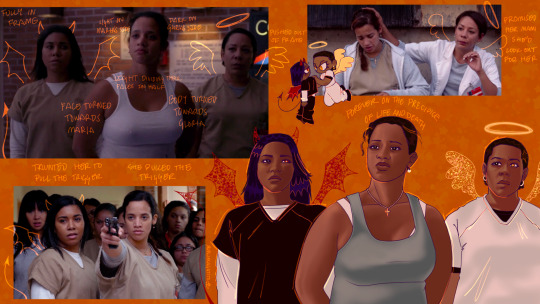
they mean the world to me
#entertwined together influencing eachothers fates#the horrors oh the horrors#the agonies the despair#maria pushing her further and further to the edge#gloria doing everything she possibly can to make sure daya doesn end up in deeper shit yet failing in the end#i could talk about them all day.....#dayanara diaz#gloria mendoza#maria ruiz#ruizdoza#oitnb#orange is the new black#mi arte#art#artists on tumblr#analysis
98 notes
·
View notes
Text
A Tale of Two Peacocks
The Relationship Between Gabriel and Michael

Some weeks ago I said I would take on the challenge of looking at the relationship between Gabriel and Michael, then I got sidetracked writing something else* - which is not always a bad thing. But I want to return to this because its too good not to do a post on it, and before I get too deeply involved in the other writing.
This is definitely going to involve some NSWF language - hey, I can't help this, its in the script - so the bulk of this is going to be below the cut. But the short of it is, they have a fairly low opinion of each other.
We need to go back to S1, where there is an interesting set of parallel scenes we should start our discussion with that spells it out for us. The first one is in S1xE2, and the other is actually in one of the deleted scenes from the cold opening of S1xE3, and they both use parallel characters to inform us of what Gabriel and Michael think of each other.
It turns out I've already talked about the first one, in this meta here, where I discuss how Newt is a parallel for Crowley.
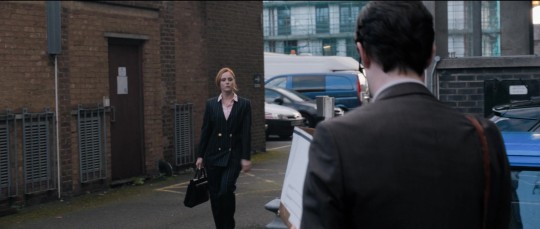
Then [Frobisher] power-walks past. Newt is not even worth her time stopping for.
"Need a hand, Dick?"
*Snort* - and ouch. That's a below-the belt joke.
She's just called him a wanker. In the US you might use the term jerk instead. Someone who's a bit egotistical and more in it for themselves than others. (and I never thought I'd be fact-checking the meaning of this word ever, but there's always a first time...) She's basically just equated him Gabriel, in my book (and in more ways than one.)
And I wrote all that months before I started writing my Crowley-Gabriel parallel/foil series, too.
The other thing about this first parallel scene is the character of Frobisher, who is dressed very much like a demon, but is actually the parallel character to Michael, as we see later on in the paintball fight at Tadfield Manor.
(Er, I know this is all a bit 2nd/3rd hand evidence, but the second scene is a bit more direct, so bear with me.)
The second one, in S2xE3, is the deleted bookshop opening scene.
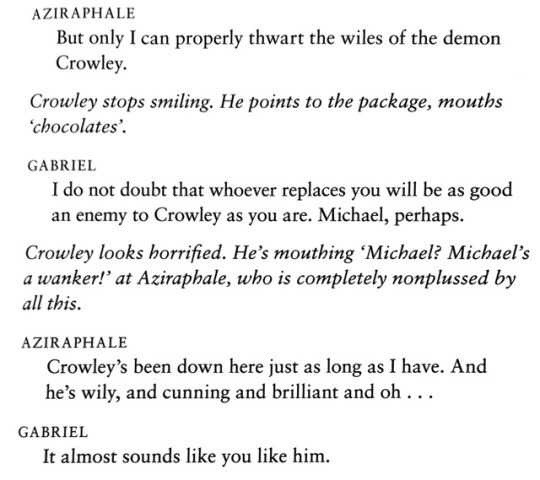
Source: Script for the unaired scene of Aziraphale opening his bookshop in 1800
Oh, look at that. Somebody is being called a wanker. Again. This time it's Crowley calling Michael a wanker, however, and its only one step to the side with Crowley being a parallel character to Gabriel (and I challenge you to watch s1 again in this light after finishing this post, and see how many similarities you can see between Crowley and Gabriel showing through even back then.)
OK. So we've established that Gabriel and Michael both think each other are wankers at this point, but what else can we find out about them?
Peacock Fighting

I've written a couple of posts about peacock symbolism. Firstly, Michael is strongly associated with having many eyes - their Ophanim ring, their costume has eye motifs, and they are essentially head of surveillance for Heaven. So this made me think they might be the peacock referred to in the Job minisode.
But later, after more research, it became apparent the lines paraphrased in Job were definitely referring to Gabriel. (See also Judgement Day.) There are associations with both royalty and vanity there.
They are both peacocks, but for different reasons.
And they are also both in competition with one another.
Gabriel Doesn't Have A Desk
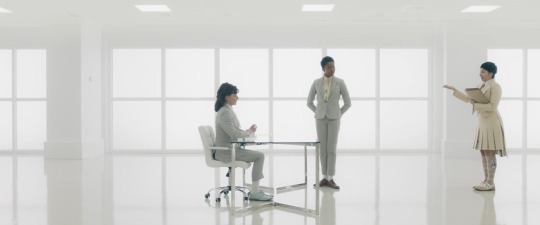
Desks are a symbol of power in western society.
The bigger, and more solid the desk in a corporate office, the higher up the person is.
The teacher at the front of the room, the authority in the room, has a bigger desk than the students.
Those desks offer protection to the person in authority sitting behind them. They mark a separation between that said authority and the masses they command on the other side. Only the most trusted get to come around to the same side that they are sitting on to be more intimate with them.
At work, your desk is connected to your identity there. Its your place in the organization. You may even individualize it with decorations.
Just take a look at what Newt was bringing on his first day to work in S1xE2:
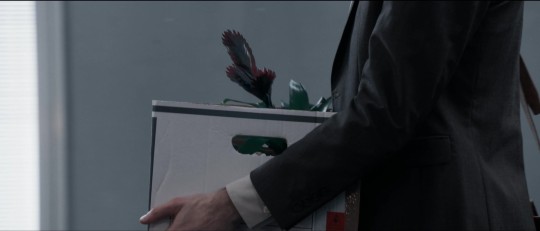
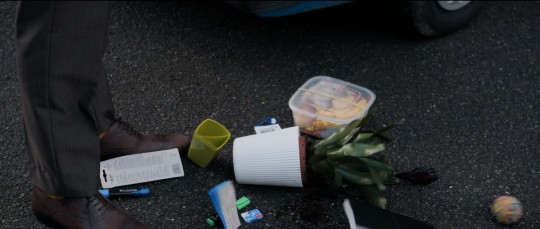
Pens, a pen holder, notepads, a ball of rubber bands, a plant (a bromeliad, a plant that does well in fully shaded damp environments, just like Hell) and some rations. Er, I mean lunch. Given to him by God Frances his mother.
The travesty of the modern trend of "hot desking" is de-personalizing the employee. They are no longer a valued employee with a valued place, they're just another faceless cog in the grind.
We see Michael behind a desk as Duty Officer in S2. It's starkly clean and sharp and made of glass, as we would expect to find in Heaven. It's used a shield and badge of office when we see them fulfilling that role.
Michael doubts Gabriel has a desk, although Gabriel insists he does, even though we have never seen it. Yet he still requires the proverbial archive box for moving locations?
I'm just going to leave the parallel between Newt and Gabriel there for further discussion. Please do remember the bottom falls out of Newt's box in the car park, leaving him with an empty box, too.
(Muriel has a glass desk, too, but interestingly they don't have a chair. You might like to compare their encounter with Aziraphale in the Job minisode to the escapade with Crowley in the present day. There is volumes said without words.)
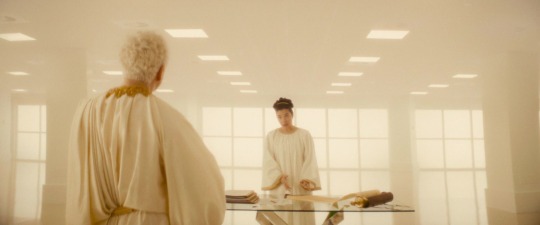
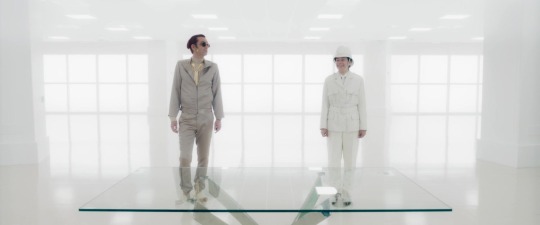
Just while we are on the subject of desks, thought you might like to compare Crowley's and Aziraphale's desks as well. They are always on about how much paperwork they have to do!
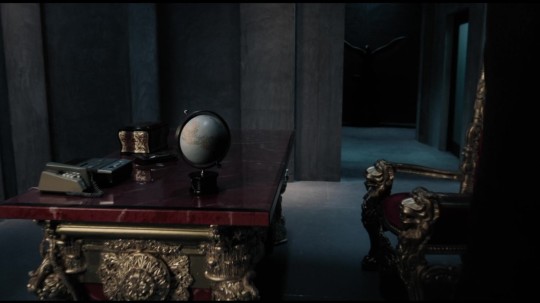
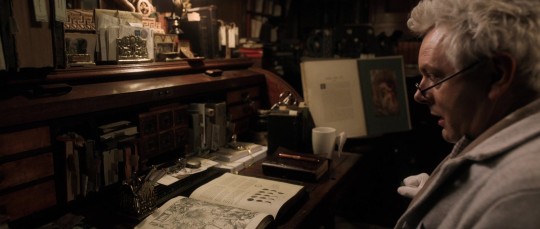
Sovereign versus Disciplinary Power
This is eventually going to turn into a discussion about fate versus free will at some point, but I do need to talk about the different types of power first, because I haven't done my long promised Power and Authority meta yet. The two concepts are closely related, and Gabriel and Michael are each acting as foils for a side of the concepts.
Gabriel represents sovereign power, the supreme legitimate power of the state. Power and action trickles down from the top, and punishment is almost a show of entertainment, but one designed to educate. "Oh, those angels Fell - if I do something bad, I might Fall, too!" And so Gabriel expects to Fall when he is given his trial, and Aziraphale when he lies to save Job's children.
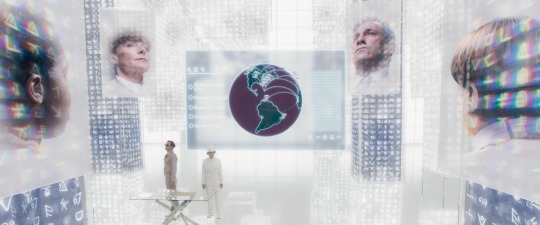
Michael is representing disciplinary power, something that lies at the heart of society today. This is where power is spread among individuals, and individuals are more likely to do their own discipline merely because of an overhanging threat of a possibility they may get caught if they do.** Are they being watched? Who might see and report their transgression? Michael has eyes (and ducks) everywhere... So does Orwell's book 1984.
This is a very simplistic view, of course - reality is more complex than that, and is usually a combination of the two, but we have to start somewhere.
Now lets throw the fate vs free will components into the mix. Let us revisit the story of King Cnut and the tide.
The story, if you are not familiar with it, is that Cnut had his throne set on the beach and commanded the incoming tide to halt where it was, and not to wet his robes or feet. Of course, the tide kept rising and splashed the king, where he leapt up and declared his might and power as a king worthless compared to that of God. The story is meant to demonstrate his piety before Heaven, and that he was not the ultimate controller of all things - his sovereign power was limited.
They say time and tide*** wait for no man - we are at the mercy of what ever fate they bring us, and we can't manipulate that. That's decided by the supreme power, the ultimate sovereign power, so to speak.
Gabriel tends to take this line - he does not have control over the summoning of the Four Horsepeople, they are just happening as they supposed to, and that's not his department. Plausible deniability, baby! Back channels? What back channels, Michael?
So if you did want to have some power over it, some free will to control outcomes? But hang on - every one else has free will as well. Sounds a bit chaotic. Who's in charge? Nobody. Everybody. Welcome to Michael's world. They want the power, they're prepared to fight for it, for what they think is right - but so is everyone else.
But what if you were the creator of free will itself? Would you be The One to have control over time and the tides?
Tadfield Manor, Again
Michael is the archangel who throws Lucifer down from Heaven, and we see this play out at Tadfield Manor during the paintball fight, when we are shown that it is actually Frobisher/Michael who shoots the shot that hits Norman/Lucifer in the heart - although we are initially made to think its Nigel/Gabriel who did it. (One day I will teach my self how to make GIFs and make a GIF of this.)
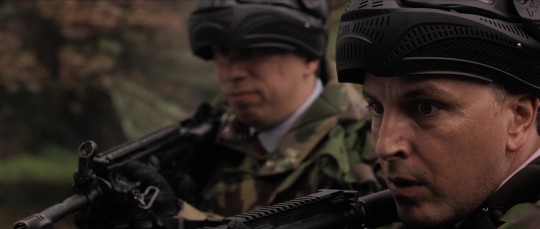
Frobisher is the more competitive one at all times - she is the only other employee besides the naive Newt to put their hand up when Nigel asks who is looking forward to the Training Initiative and she asks Crowley and Aziraphale "Who's winning?" as she runs past them inside - to which Crowley presciently declares "You're all going to lose."
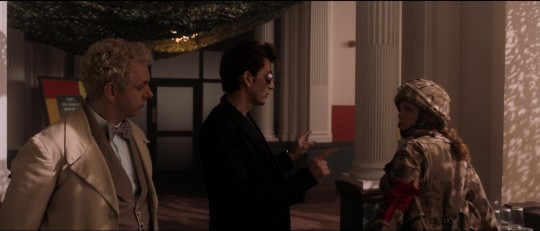
If you look at the extended scene in light of the above, you can see sovereign authority of senior manager Nigel/Gabriel is still floating around as a rather toothless tiger to the whims of fate, while everyone else is exercising their free will and disciplinary powers to try and control one another. And, as Crowley says, nobody wins. It's a lose-lose situation.
Michael is competing for an empty dream.
Gabriel is trying his best to survive something that is not what it seems.
And...I think I'll leave it there. Thanks for reading.
*I've started writing a multi-chapter human AU fanfic. But I'm a slow writer, and I'm not writing it in a linear fashion - because it has to be stuffed full of meta, of course - so I decided I better pull myself out of it before I got pulled in too far and finish a couple of things off so you didn't think I'd disappeared completely. I wasn't planning on doing one, but you know how these things go - one day an idea just pops into your head, the next thing the characters are talking to you and taking on their own life and a couple of thousand words later...
**There was a post about the oculus, (found it! thanks to gallup24) the round skylight window in the roof of the bookshop and the Panopticon, an infamous prison design where the prisoners can all see each other but can't see if the guard is watching them, but of course I've lost track of it, haven't I.
***The tides are controlled by the Moon and Sun, and ostensibly for this argument, by Heaven as well. They are fated to continue in their set orbit and/or path through the sky - or the Earth on it's orbit around the Sun, is probably the better way of looking at it.
#good omens#good omens 2#good omens meta#crowley#archangel gabriel#archangel michael#good omens analysis#tadfield manor#deleted bookshop scene#peacocks#job minisode#he doesn't have a desk#power and authority#fate vs free will#newton pulsifer#angel muriel#37th order scrivener
61 notes
·
View notes
Text
once again thinking about the worldbuilding in the riordanverse of "names are power" / "belief is power."
The Tri were only able to become immortal through convincing enough people to worship them that it became true. Monsters and immortals only exist through continued belief, and if enough people believe that they're dead or gone then it becomes true, like Pan. Their varied forms exist and manifest as they're believed in and called upon. Names call attention and epithets summon aspects. They're acknowledgement. Belief. Putting a name to a concept creates it as an individual.
And that's so fascinating when you start applying it to demigods. How much of their abilities are based on belief in themselves, in expectations of each other, in their parents' expectations of them? We've seen mortal figures who became immortal in some form or another because they were remembered. Even the lares - ancestral house gods, who persist because they're remembered. They have a legacy.
At what point does a demigod achieve that status? Rumors and whispers about them so persistent that they slowly become true. "I heard that Jason Grace is the son of two gods, does that make him a god?" "I heard Percy Jackson defeated a titan single-handedly. That he can create hurricanes without breaking a sweat. That he can control blood." After awhile, after enough rumors, does it become impossible to tell where they end and the legends begin? Isn't that what being a demigod is; half-legend?
#pjo#riordanverse#analysis#i went a little prose-y there at the end but i am THINKING THOUGHTS#imagine being a demigod and knowing your EXISTENCE is slowing becoming warped because of others' perceptions of you!#Jason living on a pedestal his entire life and worrying so much that one day he's going to bleed ichor and his fate will be sealed#Percy recognizing that his powers are growing beyond his previous limits in ways that don't seem natural. don't seem right.#and he realizes what's happening and just has to hope the whispering quiets down and the rumors are forgotten so he can live a normal life#also the potential for demigod existential horror#becoming aware that You as a concept is slowly shifting. twisting. to match the perception others have of you#how TERRIFYING is that? like obviously it'd probably only go to an extent for most demigods cause half-mortal#but their powers? etc? SCARY#Percy being aware that his powers are becoming warped and trying to dissuade gossip about himself so it returns to normal#Nico who the more he's welcomed into the camps the more he finds himself being essentially declawed#his rough edges slowly worn away. his powers weakening and becoming less frightening. is it worth it?#and how difficult must that inherently make it for him to allow himself to be known?#and again. shaking Jason petrified that CJ is going to accidentally believe him into immortality. his worst nightmare.
201 notes
·
View notes
Text
So, my girlfriend discovered that the names of the Nightsister “Mothers”, are different spellings of the Fates in Mythology. This is fitting since the Fates are quite literally “weaving” everyone’s fates and are in control of their paths, similar to Nightsister Magic.

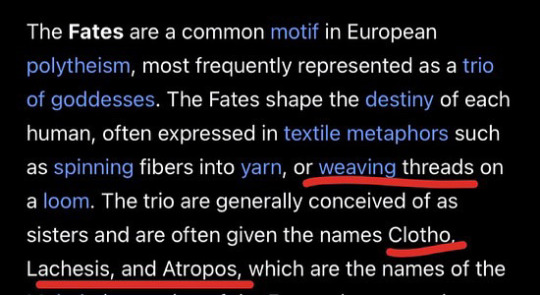
But there’s more.

The witches (the fates) are the ones to pull Sabine away, entrapping her with magic and pulling her away. Away from Shin.

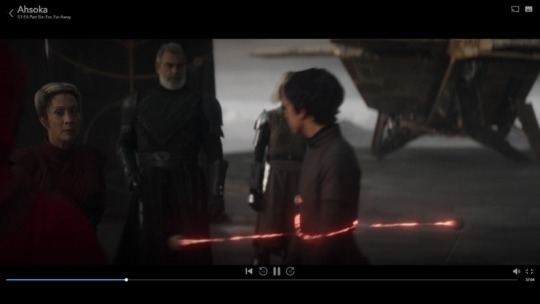
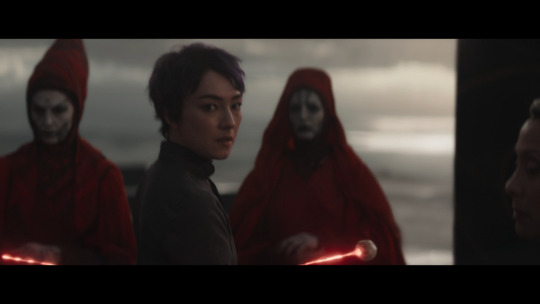
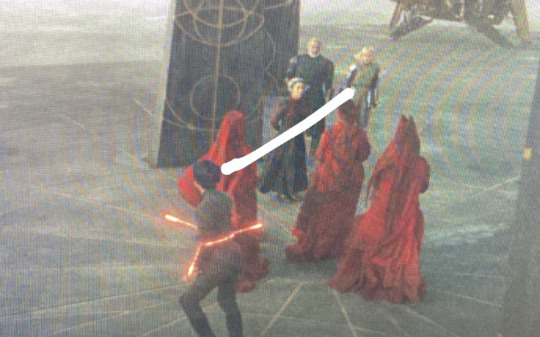
As sabine turns her head, it’s easy to think she’s looking at Baylan, perhaps frustrated with their agreement becoming more shaky—but look at the bottom. Her eye-line is directly aimed, lined up with Shin. In the last frame, what are they separated by?
The fates.
We also see that Shin looks at Sabine, around the same time that Morgan does… almost as if she’s trying to be protective of her? And where else do we see this?

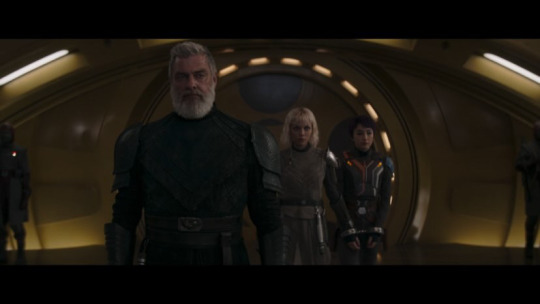
Both on the ship on the descent down, and when Shin first brings her on the ship. It’s almost like she’s getting between Sabine and Morgan… Morgan is a Nightsister as well. She’s very close to the fates that are pulling them apart, which is quite literally referencing classic mythology. Shin seems to be protecting Sabine from Morgan, and Shin has stated on multiple occasions that she seems to have a distaste for Nightsisters (with her lines like “more witches?”)

Shin and Sabine have been torn apart by fate here, literally. It goes with every mythological story, and reminds me of classic tarot cards. In my opinion, Sabine and Shin represent the lovers—quite literally torn apart by fate.
The Fates, in the form of the Nightsister Mothers, have torn the lovers apart with magick (similar to the threads of fate that are woven in mythology). Shin and Sabine fit the “lovers” type a little too well. Especially with how concerned Shin has looked in the past… it’s like she knew. It’s like she’s aware of their uneasy fate, and she’s doing whatever she can to prevent it.
Sabine and Shin are the modern Star Wars equivalent of the lovers, and they’re beginning to realize it themselves.
#credit @ Sithsandstardust for the screenshots#and the insight#I love my girlfriend#star wars#sabine wren#shin hati#sabinewren#sabine x shin#sabine wren x shin hati#sabineshin#shin x sabine#shin hati x sabine wren#shinhati#the lovers#the fates#mythology#mythical#myth#tarot cards#analysis#film analysis#theory#film theory#wolfwren#wrenwolf#shinbine
155 notes
·
View notes
Text
I had another one of those thoughts that are bordering on slightly delusional.
Chances are it's already been pointed out by someone before me, but. How come Geto's body reacting to Gojo calling out to him was 'a first' for Kenjaku? Did they only ever choose those who happened to have no loved ones that would want their person back? But we have Itadori's parents, and they deeply loved each other and didn't stop loving till the very end. Is the bond between Satoru and Suguru really so strong as to surpass the one between a happily married couple? And then it sort of struck me that perhaps it's the first time Kenjaku so openly and directly violates their host body's will.
I like to entertain the thought that Kenjaku is not at all detached from human connections and emotion. While they are capable of seperating their conscious from the experience that comes along with the body they're inhabiting, this experience is still an intrinsic part of that body. All romanticization aside, one's personality is dictated by one's physiology. Our feelings are something biological, a network of interconnected structures and chemical levels within our bodies. Who we are is engraved upon our hearts, in a literal sense. To quote Kenjaku themself, 'The body is the soul, and the soul the body'. If it were otherwise, they probably wouldn't be able to mimic various people's personalities so accurately and convincingly as to fool their closest friends and family.
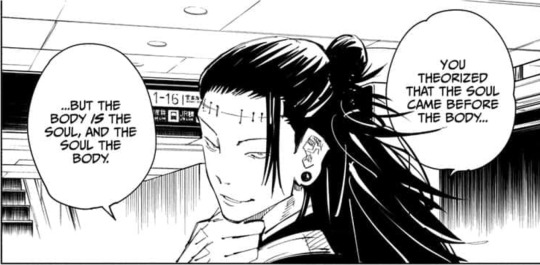
So maybe Kenjaku does feel their host's lingering emotions and is to some degree influenced by its impulses. Maybe while in Kaori's body they did feel the love that remained in her for Jin, did feel the body's budding affection towards a child it gave birth to, did have some maternal instinct. But knowing full well those feelings are but a product of their current body, I imagine they have a far better grasp on them, too, and treat them as tools at their disposal, just sometimes indulging in what the body tells them to do. In Kaori's case, I think they could afford to go with the flow more. They felt the body's urges and responded by acting upon them -- because why not? They're an epitome of 'mess around and find out'.
With them taking over Geto's body, it's different. They're no longer eminence grise operating from the shadows, they've entered the game they'd been orchestrating for so long. Now they're truly proactive, and no longer being under disguise they're more themself than ever, too. And it directly contradicts with the person Geto is (or was). We do not yet know what Kenjaku's true intentions are, but it's unlikely they align with what Geto would want to put his mind to.
And Geto never wanted to do any harm to Gojo. In those ten years, never once did he make a move directly against him. Meanwhile it's an inherent part of Kenjaku's plans. So when it comes to it, Geto's very nature, those tiny glimpses of him still lingering somewhere within his body, cries out against it.
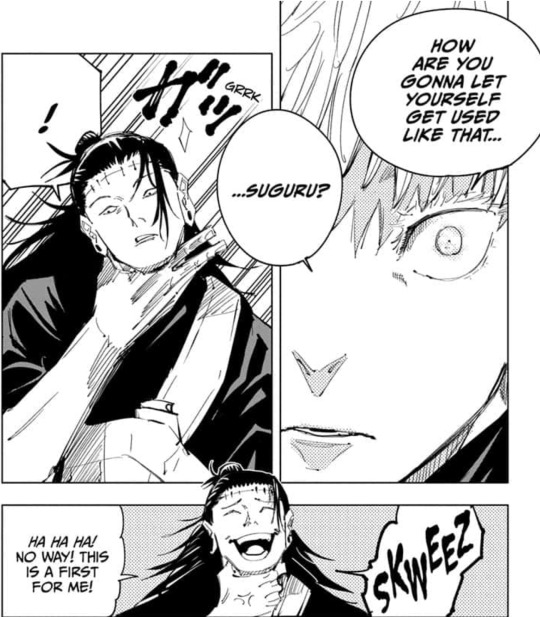
Caring for people around him was Geto's defining trait, and his body still carries those attachments, that love. Responding to Gojo is an instinct his flesh still remembers. Trying to protect him is engraved upon Geto's muscle memory. Kenjaku's actions are essentially at odds with all that, so that puts the body and the soul in discord -- and they clash eventually, getting out a reaction from otherwise dormant and inanimate flesh. No wonder Kenjaku calls that poetic.
#jujutsu kaisen#jjk#jjk analysis#kenjaku#kaori itadori#jin itadori#gojo satoru#geto suguru#satosugu#alright i'm back and come bearing angst again#actually i think kenjaku has some sort of strange fascination with gojo#be it satoru or the gojo clan with their six eyes technique in general#they believe that next stage of evolution lies in optimizing cursed energy#and the six eyes allow for insanely high precision and control when it comes to manipulating cursed energy#if i were them i'd fascinated by this fact alone#aside from this whole 'bound by fate to tengen' business#*rattles my cage*#gege pleass i need to know#side note: god kenjaku is an incredibly interesting character#and a great villain too#i'm dying to learn more about them#jjk meta
198 notes
·
View notes
Text
OC Inspiration | tags below the cut
Rules: Share your OCs and two characters from other media that influenced them the most.

Romy Brandt (Professionals)


Emily Thorne (Revenge)




Cassie Bedford (The InBetween)


Catherine Chandler (Beauty & the Beast)



Tagged by @voidika @thesingularityseries @shellibisshe @theelderhazelnut @rhettsabbott
@direwombat @impossible-rat-babies and @kyberinfinitygems
Tagging, @socially-awkward-skeleton @la-grosse-patate @strangefable @strafethesesinners @aceghosts
@derelictheretic @dumbassdep @josephslittledeputy @josephseedismyfather @captastra
@trench-rot @harmonyowl @cassietrn @purplehairsecretlair @cloudofbutterflies92
@simonxriley @justasmolbard @finding-comfort-in-rain @icecutioner @wrathfulrook
@g0dspeeed @carlosoliveiraa @simplegenius042 @raresvtm
@killyourrdarlingss @katsigian and anyone that would like to do the tag <3
#tagged <3#that second gif of Romy kicking Jack's ass is absolutely Oakley taking up Oliver on his suggestion to spar with him#only his pride isn't hurt rather he gets a kick out of getting her to agree to do something with him even if he loses miserably#and yes; that is indeed Barry Sloane dunking Emily <3#one can say there's quite the funny parallel between that scene and Oakley's beef with John#for lil context: Cassie basically sees ghosts and they show her how they had died#her empathy for victims and determination to get justice for the ghosts is definitely something she and Sabrina have in common#Catherine also has her own version of 'destined by fate' ship with Vincent on top of being in law enforcement#oc: oakley moore#oc: sabrina donovan#wip: in hope of tomorrow#fc5 deputy#far cry 5 oc#fc5 ocs#far cry 5 deputy#character reference#character background#myedits#mygifs#oc tag game#oc tag#tag games#character tag#character analysis#emily vancamp#ocs
43 notes
·
View notes